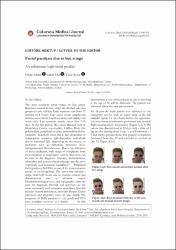Facial paralysis due to bee stings
Özet
To the Editor, The most common insect stings are bee stings. Reactions caused by bee stings are divided into two groups as early and late. Early reactions start from 15 minutes to 4 hours. They cause severe anaphylaxis and can cause death. Local reactions and anaphylaxis occur early. Late reactions usually occur after 7-10 days. In the late period, they cause diseases such as Myasthenia Gravis, myocarditis, Gullian Barre like polymyelitis, peripheral neuritis, glomerulonephritis, vasculitis. Reactions occur due to IgE-dependent or independent reactions. IgE-dependent individuals due to increased IgE, depending on the release of mediators such as histamine, proteases, locotransgenins and thromboxanes. Due to the influence of these mediators, wide range of complaints from local reactions to anaphylaxis occurs. Skin tests can be used in the diagnosis. Steroids, antihistamines, adrenaline and venom immunotherapy are the most commonly used treatment modalities1,2. Peripheral facial paralysis, Bell Palsi, is one of the most common causes of otolaryngology. The nerve that induces a single facial half occurs due to traumas, tumors and disconnection due to ischemic events. Electrophysiological tests and topographic tests are used for diagnosis. Steroids and antivirals are the most commonly used treatment modalities. Steroids increase muscle movement; antivirals Herpes Zoster infections and idiopathic cases are also useful. The prognosis of Bell's paralysis is very good, and 85% have complete recovery in 4 weeks3. In this presentation, a case of facial paralysis due to bee sting at the age of 18 will be discussed. The patient was informed about the case presentation. An 18-year-old male patient was admitted to our emergency service with an apical sting in the left mastoid region for two hours before the operation. Ear nose throat examination performed was normal. Right facial paralysis was present. The patient was discontinued in 12 days with a dose of 3 mg per day starting from 1 mg / kg of Feniramin 1 * 1 and methyl prednisolone. The patient's complaints decreased from day 10 and returned to normal on Day 15.
















